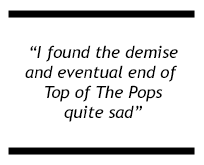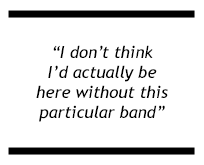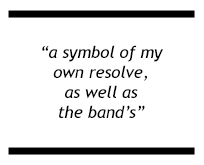The Cranberries – Bury The Hatchet
Undoubtedly, there were albums I owned before this one, but they were presents. I count this as “my first album” as it was the first one I bought with my own money, which, as a paperboy earning approximately 6p per newspaper, was a big deal.
I’d seen the video for Promises on MTV (back when it was actually a music channel), and there was something in it that grabbed my attention straight away. I’m not sure if it was the intro itself, all lightly-strummed chords and chilling “ooooh” vocals, or the juxtaposition of that intro with the aggressive rock that followed. Or even the histrionic vocals of the much-missed Delores O’Riordan, but I was hooked. Follow-up single Animal Instinct, which features what is probably my favourite recorded acoustic guitar part, was similarly attention-grabbing, and I was hooked. Living on the outskirts of a small town, however, meant that acquiring the album itself meant a bus trip to the nearest city with a reputable music store, in my case the Virgin Megastore in Liverpool.
Approximately £14.99 later, I owned the album. The thing that has stuck with me in the 20 years or so since then is the varying sounds across the tracks. Rock tracks like Promises and Delilah sit comfortably alongside the quieter moments like Shattered and the haunting, piano led Dying In The Sun, all tied together by the remarkable vocals.

Idlewild – 100 Broken Windows
I found the demise and eventual end of Top of the Pops quite sad, as it introduced me to a few bands over the years. Idlewild were one of those bands. I believe, though cannot say for certain, that it was Actually It’s Darkness, the lead single from this album. There was something identifiable about the band on screen. Here was a band that looked like me and my friends, making songs that sounded like the songs we wanted to make.
Roddy Woomble has since become one of my favourite lyricists. There’s a beautiful subtlety in the lyric to Roseability, which features three near-identical verses, save for the change from “don’t” to “can’t” to “won’t” in the line about photograph albums. It’s a simple change, but very clever, as it changes the meaning of each verse.
Interestingly, this album contains the only track in the entire Idlewild catalogue that I skip, Rusty. I don’t know why, but I’ve just never liked it. Still, when the other eleven tracks on the album are as perfect as they are, one bad apple doesn’t spoil the bunch.

Brand New – Science Fiction
First things first, Jesse Lacey is a piece of garbage, if the allegations that came out in 2017, a month or two after this album, are to be believed.
That said, and without wanting to be too dramatic, I don’t think I’d be here without this particular band. I missed their first album, but the other four appeared in my life with strange timing in periods where, mentally, I was in a varying degree of places, from the middling, to the downright awful.
This album, their last, coincided with a period of depression so horrific that I ended up on anti-depressants, struggling in all aspects of my life, and it appears in this list because I found myself identifying with many of the lyrics on the record. The stand out track, Can’t Get It Out, features the following passage:
Because I don't want to surrender
Or lose your face in the crowd
I finally found all my courage
It was buried under the house
Not just a manic depressive
Toting around my own cloud
I've got a positive message
Sometimes I can't get it out
Looking back on it now, it doesn’t read as the most profound lyric in the world, but the emotion in the delivery of “Not just a manic depressive / toting around my own cloud” really stood out to me in the hole I was in, and helped me to the realisation that I wasn’t going to let the situation define me.
Feeder – Yesterday Went Too Soon
God bless WHSmith. No idea how they’re still going, when many other high street retailers have gone, but for a long time, they and Woolworths were the only places I could buy any sort of music. One of my favourite ways of passing the time waiting for the bus after football training on a Saturday morning was rooting through the bargain bin to see what old singles could be found. Consequently, I found the CD single of the title track of this album for about 20p.
A couple of years later, when Buck Rogers was everywhere, I found myself thinking, “I’m sure I’ve got something by this band.” I may have even indulged in a little bit of “I knew them before they were successful” behaviour, but it was nice to see a band I liked finding some commercial success and getting recognition.
Much like The Cranberries, I’ve always admired the variety across Feeder’s catalogue of music, and I feel that this record captures them at their best. Insomnia is a wonderful piece of pop-rock with a euphoric singalong chorus, whereas final single Paperfaces is a vulnerable piece of balladry that I don’t think they’ve bettered since.
Bassist Taka Hirose is also a hero of mine. There’s a passion in his stage-presence that I think is lacking in many bassists in music, and when I started playing bass myself, Taka was the inspiration for me not wanting to stand in the same one foot square of stage space.
Suede – Coming Up
Many people will tell you that Dog Man Star is better. They may well be right. But I always hold a special place in my heart for albums that introduce me to bands, which is where Coming Up sits.
I was a little late to the party with Suede, only properly discovering them after their split in 2003 when I was at university. I’d acquired a Best of ‘96 CD, possibly from that WHSmith bargain bin, and it contained Trash on CD2. I’d ignored it for a number of years, and I have no idea how or why it grabbed my attention when it did. There was something about the “us against them” nature of the lyrics that appealed to me in my late teens, and because I had a student loan to spend, I bought every Suede album available at that point. If I had listened to them in release order, Coming Up may not have been on this list, but it’s the one I started with. Most of the record appeals to my love of a good pop song, with catchy singles like Trash, Lazy and Beautiful Ones up there with Wannabe, Wonderwall and Alright as some of the catchiest bits of pop music of the ‘90s.
Then you have Saturday Night. Beautifully sparse guitar arpeggios, drums that shuffle the rhythm along nicely, and that bassline in the verse! Matt Osman is, in my opinion, sorely underrated as a bass player. He epitomises the art of bass playing perfectly, knowing exactly when to show off, without ever looking or sounding like he is, never complicating his playing for the sake of it, and always complimenting the song, which is always the most important thing.
David Ford – Let The Hard Times Roll
Sometimes, you discover a singer where it feels like they’ve tapped into your head and are singing exactly what you would sing yourself, given the chance. Since discovering him as a part of the short-lived indie band easyworld in 2002, and then watching him grow as a singer-songwriter, if I could have written the repertoire of one songwriter, it would be David Ford.
I could have picked any of his records, but I picked this one as I feel it is the most complete representation of everything that he does, from the opening salvo of Panic!, played live using a loop-station to build layers of the song for him to perform over, to the beautiful piano balladry of To Hell With The World, the stoic Stephen, named in honour of murdered Northern Irish policeman Stephen Carroll.
The highlight of the album, however, is Waiting For The Storm. Ford used to introduce it live as a song that he believed that someone else had written, as it came to him fully-formed in a dream, and he couldn’t believe no-one had written it before. Whilst this may be a little bit of artistic exaggeration, the song itself is a humble tale of self-reflection, featuring one of Ford’s most passionate vocals as the song builds towards its defiant climax of “All this weary flesh and bone / I still walk this path alone / Just waiting for the storm.”

Manic Street Preachers - Send Away The Tigers
I struggled to whittle this down to a single record. I could have picked the album that got me into the Manics, which was Know Your Enemy. I could have picked their most successful, Everything Must Go, or I could have picked their best, The Holy Bible. However, I’ve picked Send Away the Tigers for a few reasons.
The first is artistic. Following their commercial low point of 2004’s Lifeblood, coupleD with James Dean Bradfield and Nicky Wire both releasing solo albums in 2006, there was a fear at the time amongst a lot of Manics fans that we might not see a new Manics album for a long time, possibly ever. (This itself is backed up by Nicky Wire’s story of passing over the Oresund Bridge between Sweden and Denmark, thinking about leaving the band, which is heavily rumoured, though not confirmed, to have been sometime around 2004/05). Send Away The Tigers was a storming return to form for the band, critically acclaimed and commercially successful. They would probably never again headline major festivals as they had at their commercial peak, but they had a new-found resolve and belief that there was a place for them in the modern music industry. Without this album, I don’t think they would have had the confidence to look back at the lyrics Richey had left behind and turn them into Journal For Plague Lovers without it looking like a cynical money grab.
The second is more personal. I started 2007 living in Chester, and ended it living in London. The last gig I saw as a Chester resident was the Manics at Manchester Apollo in May of 2007. The first gig I saw living in London was the Manics at Brixton Academy in December. In between, I had moved to London with my friends, who were all in a band together, and very nearly moved back within about four days. Truth be told, I’m not sure how close I came to packing up my bags and leaving London in that first week, but I think if I had been able to drive away in my friend’s van where all my stuff lived for that first week, I probably would have done. So, Send Away The Tigers, for me, is a symbol of my own resolve, as well as the band’s.
Theaudience - theaudienc
So, to finish, something a little out of left-field.
I heard the fourth single from this album once, around the time of its release in 1998, possibly on MTV2. And it wasn’t available anywhere. It seemed like I might have imagined it, especially when no-one else I knew had heard of the band, and neither had anyone in the nearby music shops.
Fast-forward a number of years, with the development of the internet, Sophie Ellie-Bextor’s pop career, and A Pessimist Is Never Disappointed making a surprise, yet very welcome, appearance on the very first episode of The Inbetweeners, I was reminded of the single previous listening experience of this band, and I managed to track down a copy of theaudience’s self-titled, and disappointingly, only album.
I Know Enough was still the catchy three-minute piece of pop genius I remembered it being, with Running Out Of Space and The Shoebox Song being similar in style. There was the brooding I Got The Wherewithal, You Get What You Deserve’s delightful build up to a squalling guitar finale, the near-seven minute musical indulgence of final track How’s That?
The absolute standout track for me, though, is The More There Is To Do, possibly the most musically sparse track on the record. Single strums of guitar, punctuated with the occasional snare roll until nearly the three minute mark, ensuring that Ellis-Bextor’s angelic vocals are the centrepiece of the song.
Bio
Neil Armstrong is 36 and lives in Broadstairs, Kent, with his wife Penny. He writes lyrics and pretends to be a musician by playing bass in the band Striking Thirteen, who can be found on twitter @Striking13Band and on facebook at www.facebook.com/strikingthirteenband Neil’s own twitter is @ofmilesfromhome and he posts occasional photos on his own Instagram, alotofmilesfromhome


